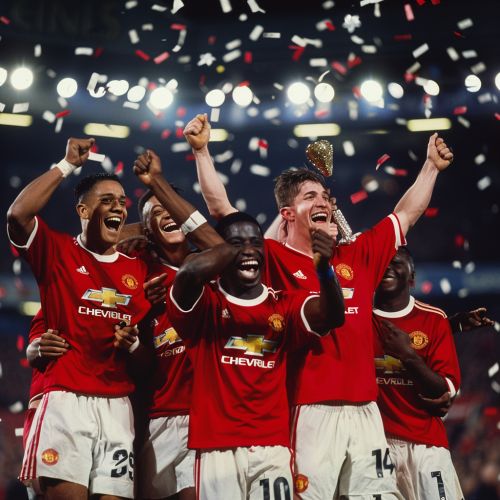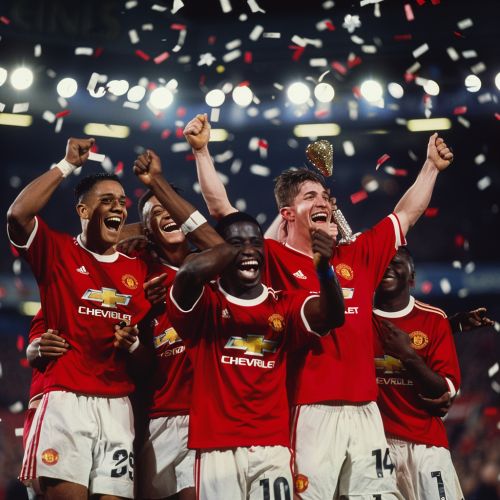List of English Premier League Champions: Difference between revisions
(Created page with "== List of English Premier League Champions == The English Premier League (EPL) is the top tier of English football, established in 1992. Since its inception, it has become one of the most popular and competitive football leagues in the world. This article provides a comprehensive list of all the champions of the English Premier League, along with detailed information about each season's outcomes, notable events, and key players. === Overview === The English Premier L...") |
No edit summary |
||
| Line 12: | Line 12: | ||
The inaugural season of the Premier League saw [[Manchester United]] emerge as champions. Managed by Sir [[Alex Ferguson]], Manchester United secured the title with a 10-point lead over second-placed [[Aston Villa]]. Key players included Eric Cantona, who was instrumental in their success. | The inaugural season of the Premier League saw [[Manchester United]] emerge as champions. Managed by Sir [[Alex Ferguson]], Manchester United secured the title with a 10-point lead over second-placed [[Aston Villa]]. Key players included Eric Cantona, who was instrumental in their success. | ||
[[Image:Detail-97167.jpg|thumb|center|Manchester United players celebrating their 1992-1993 Premier League victory.|class=only_on_mobile]] | |||
[[Image:Detail-97168.jpg|thumb|center|Manchester United players celebrating their 1992-1993 Premier League victory.|class=only_on_desktop]] | |||
==== 1993-1994 ==== | ==== 1993-1994 ==== | ||
Latest revision as of 11:46, 24 July 2024
List of English Premier League Champions
The English Premier League (EPL) is the top tier of English football, established in 1992. Since its inception, it has become one of the most popular and competitive football leagues in the world. This article provides a comprehensive list of all the champions of the English Premier League, along with detailed information about each season's outcomes, notable events, and key players.
Overview
The English Premier League was formed in 1992, replacing the First Division as the top level of English football. The league operates on a system of promotion and relegation with the English Football League (EFL). Each season, 20 clubs compete, with each team playing 38 matches (home and away against every other team). The team with the most points at the end of the season is crowned the champion. Points are awarded based on match results: three points for a win, one point for a draw, and none for a loss.
Champions by Season
1992-1993
The inaugural season of the Premier League saw Manchester United emerge as champions. Managed by Sir Alex Ferguson, Manchester United secured the title with a 10-point lead over second-placed Aston Villa. Key players included Eric Cantona, who was instrumental in their success.


1993-1994
Manchester United retained their title in the 1993-1994 season, finishing eight points ahead of Blackburn Rovers. The team was bolstered by the performances of players like Roy Keane and Mark Hughes.
1994-1995
Blackburn Rovers won their first Premier League title in the 1994-1995 season. Managed by Kenny Dalglish, Blackburn's success was largely due to the prolific goal-scoring partnership of Alan Shearer and Chris Sutton.
1995-1996
Manchester United reclaimed the title in the 1995-1996 season. This season was notable for the emergence of the "Class of '92," including David Beckham, Paul Scholes, and Gary Neville, who played crucial roles in the team's success.
1996-1997
Manchester United continued their dominance by winning the Premier League again in the 1996-1997 season. They finished seven points ahead of Newcastle United.
1997-1998
Arsenal, managed by Arsène Wenger, won their first Premier League title in the 1997-1998 season. The team was known for its strong defense, led by Tony Adams, and the attacking prowess of Dennis Bergkamp and Nicolas Anelka.
1998-1999
Manchester United won the title in the 1998-1999 season, completing a historic treble by also winning the FA Cup and the UEFA Champions League. Key players included Dwight Yorke, Andy Cole, and Ryan Giggs.
1999-2000
Manchester United continued their success by winning the Premier League in the 1999-2000 season with a record 18-point margin over second-placed Arsenal.
2000-2001
Manchester United secured their third consecutive Premier League title in the 2000-2001 season. The team was once again dominant, finishing 10 points clear of Arsenal.
2001-2002
Arsenal won their second Premier League title in the 2001-2002 season, finishing seven points ahead of Liverpool. The team was known for its attacking style, with Thierry Henry and Robert Pires playing key roles.
2002-2003
Manchester United reclaimed the title in the 2002-2003 season, finishing five points ahead of Arsenal. The season was marked by the emergence of Ruud van Nistelrooy as a prolific goal scorer.
2003-2004
Arsenal went unbeaten throughout the entire 2003-2004 season, a feat that earned them the nickname "The Invincibles." The team, managed by Arsène Wenger, finished 11 points ahead of Chelsea.
2004-2005
Chelsea, under the management of José Mourinho, won their first Premier League title in the 2004-2005 season. They set a record for the most points in a single season (95) and conceded only 15 goals.
2005-2006
Chelsea retained their title in the 2005-2006 season, finishing eight points ahead of Manchester United. The team was known for its solid defense and the midfield dominance of Frank Lampard.
2006-2007
Manchester United won the Premier League in the 2006-2007 season, ending Chelsea's two-year dominance. The team was led by Cristiano Ronaldo and Wayne Rooney.
2007-2008
Manchester United retained their title in the 2007-2008 season, finishing two points ahead of Chelsea. The season was notable for the partnership between Cristiano Ronaldo and Carlos Tevez.
2008-2009
Manchester United won their third consecutive Premier League title in the 2008-2009 season, finishing four points ahead of Liverpool. The team was once again led by Cristiano Ronaldo.
2009-2010
Chelsea won the Premier League in the 2009-2010 season, finishing one point ahead of Manchester United. The team, managed by Carlo Ancelotti, set a record for the most goals scored in a single season (103).
2010-2011
Manchester United reclaimed the title in the 2010-2011 season, finishing nine points ahead of Chelsea. The season was marked by the emergence of Javier Hernández as a key player.
2011-2012
Manchester City won their first Premier League title in the 2011-2012 season in dramatic fashion. They secured the title on the final day of the season with a last-minute goal by Sergio Agüero, finishing ahead of Manchester United on goal difference.
2012-2013
Manchester United won their 13th Premier League title in the 2012-2013 season, finishing 11 points ahead of Manchester City. This season marked the final campaign for Sir Alex Ferguson as manager.
2013-2014
Manchester City won their second Premier League title in the 2013-2014 season, finishing two points ahead of Liverpool. The team was known for its attacking prowess, with Yaya Touré and Sergio Agüero playing key roles.
2014-2015
Chelsea, managed by José Mourinho, won the Premier League in the 2014-2015 season, finishing eight points ahead of Manchester City. The team was known for its strong defense and the midfield dominance of Eden Hazard.
2015-2016
Leicester City won their first Premier League title in the 2015-2016 season in one of the most remarkable achievements in football history. Managed by Claudio Ranieri, Leicester finished 10 points ahead of Arsenal. Key players included Jamie Vardy and Riyad Mahrez.
2016-2017
Chelsea won the Premier League in the 2016-2017 season, finishing seven points ahead of Tottenham Hotspur. The team, managed by Antonio Conte, was known for its solid defense and the attacking contributions of Eden Hazard and Diego Costa.
2017-2018
Manchester City, managed by Pep Guardiola, won the Premier League in the 2017-2018 season with a record 100 points. They finished 19 points ahead of Manchester United. The team was known for its attacking style, with Kevin De Bruyne and Raheem Sterling playing key roles.
2018-2019
Manchester City retained their title in the 2018-2019 season, finishing one point ahead of Liverpool. The season was notable for the intense title race between the two teams, with City securing the title on the final day.
2019-2020
Liverpool won their first Premier League title in the 2019-2020 season, finishing 18 points ahead of Manchester City. The team, managed by Jürgen Klopp, was known for its high pressing style and the attacking trio of Mohamed Salah, Sadio Mané, and Roberto Firmino.
2020-2021
Manchester City won the Premier League in the 2020-2021 season, finishing 12 points ahead of Manchester United. The team was known for its solid defense and the midfield dominance of Kevin De Bruyne.
2021-2022
Manchester City retained their title in the 2021-2022 season, finishing one point ahead of Liverpool. The season was marked by the intense competition between the two teams, with City securing the title on the final day.
Notable Records and Statistics
The English Premier League has seen numerous records and statistics that highlight the competitiveness and quality of the league. Some of the most notable records include:
- **Most Titles:** Manchester United holds the record for the most Premier League titles, with 13 championships.
- **Most Points in a Season:** Manchester City set the record for the most points in a single season with 100 points in the 2017-2018 season.
- **Most Goals in a Season:** Chelsea holds the record for the most goals scored in a single season with 103 goals in the 2009-2010 season.
- **Longest Unbeaten Run:** Arsenal holds the record for the longest unbeaten run in the Premier League, going 49 matches without a loss from May 2003 to October 2004.
- **Most Consecutive Titles:** Manchester United holds the record for the most consecutive titles, winning three in a row on two occasions (1998-1999 to 2000-2001 and 2006-2007 to 2008-2009).
Key Players
Throughout the history of the Premier League, several players have made significant contributions to their teams' successes. Some of the most notable players include:
- **Eric Cantona:** Known for his leadership and skill, Cantona played a crucial role in Manchester United's early successes in the Premier League.
- **Thierry Henry:** One of the greatest strikers in Premier League history, Henry was instrumental in Arsenal's successes, including their unbeaten season in 2003-2004.
- **Cristiano Ronaldo:** Ronaldo's contributions to Manchester United's titles in the mid-2000s were significant, and he is widely regarded as one of the best players in the history of the league.
- **Frank Lampard:** A key player for Chelsea, Lampard's goal-scoring ability from midfield was crucial in their title-winning campaigns.
- **Sergio Agüero:** Known for his goal-scoring prowess, Agüero played a vital role in Manchester City's successes, including their dramatic title win in the 2011-2012 season.
Managerial Influence
The role of managers in the success of Premier League teams cannot be overstated. Some of the most influential managers in the history of the league include:
- **Sir Alex Ferguson:** Widely regarded as one of the greatest managers of all time, Ferguson led Manchester United to 13 Premier League titles during his tenure.
- **Arsène Wenger:** Wenger's innovative approach to football and his emphasis on attacking play led Arsenal to three Premier League titles, including the unbeaten season in 2003-2004.
- **José Mourinho:** Known for his tactical acumen, Mourinho led Chelsea to three Premier League titles during his two spells at the club.
- **Pep Guardiola:** Guardiola's emphasis on possession-based football has led Manchester City to multiple Premier League titles, including the record-breaking 100-point season in 2017-2018.
- **Jürgen Klopp:** Klopp's high pressing style and emphasis on teamwork led Liverpool to their first Premier League title in the 2019-2020 season.
